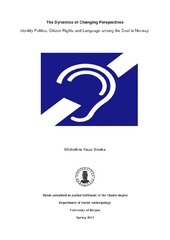| dc.contributor.author | Biseke, Michelline Keza | eng |
| dc.date.accessioned | 2013-07-30T05:50:57Z | |
| dc.date.available | 2013-07-30T05:50:57Z | |
| dc.date.issued | 2013-05-30 | eng |
| dc.date.submitted | 2013-05-30 | eng |
| dc.identifier.uri | https://hdl.handle.net/1956/6849 | |
| dc.description.abstract | This thesis is centered around the two conflicting discourses on deafness. Deafness can be understood as both a medical and cultural terms. However, both these discourses are highly contested. This thesis aims at exploring the dynamics entailed in the formation of these by juxtaposing them. The deaf are increasingly establishing themselves as a linguistic minority, and identifying themselves as Deaf" in a reflexive process of rejecting the disability label" and normalizing ideologies ingrained in the medical and contemporary view of deafness. I examine the development of this reflexive process by looking at how the medical categorization paves the way for group identification and how the deaf have forged a community and common identity around deafness. The Deaf identity is not given but achieved. I include the internal processes experienced in attaining this identity. The disability label is rejected by transferring the individual affliction onto the disabling phonocentric society. Deaf are visually orientated and primarily use Sign Language, a visual language. This thesis analyses the dynamics involved in the multifaceted symbolism of language to the deaf and how it is politicized most especially in claiming of the uniqueness of the deaf, education, fighting for deaf rights and in boundary demarcating and negotiating deafness. To the deaf, access to language is necessary for equal participation in the society where SL interpretation is a tool for facilitating communication. In this thesis also includes interpreter provisions in public institutions and their problematic shortcomings. Technology advancements have also been influential in transforming deafness. These traditionally in the realm of medical practice have been received with conflicted feelings by the Deaf; they allow them to participate in mainstream society but also simultaneously alienating them from themselves. Inevitable changes like the increase of Cochlear implanted children this has led to negotiating an identity that can accommodate these changes. | en_US |
| dc.format.extent | 1352887 bytes | eng |
| dc.format.mimetype | application/pdf | eng |
| dc.language.iso | eng | eng |
| dc.publisher | The University of Bergen | eng |
| dc.subject | Deaf | eng |
| dc.subject | Hard of hearing | eng |
| dc.subject | Deaf culture | eng |
| dc.subject | Deaf identity | eng |
| dc.subject | Lingusistic Minority | eng |
| dc.subject | Interpretation | eng |
| dc.subject | Legal interpretation | eng |
| dc.subject | Deaf politics | eng |
| dc.title | The Dynamics of changing perspectives: Identity politics, citizen rights and language among the deaf in Norway | eng |
| dc.type | Master thesis | en_US |
| dc.rights.holder | Copyright the author. All rights reserved | en_US |
| dc.description.degree | Master i Sosialantropologi | |
| dc.description.localcode | SANT350 | |
| dc.description.localcode | MASV-SANT | |
| dc.subject.nus | 738106 | eng |
| fs.subjectcode | SANT350 | |
